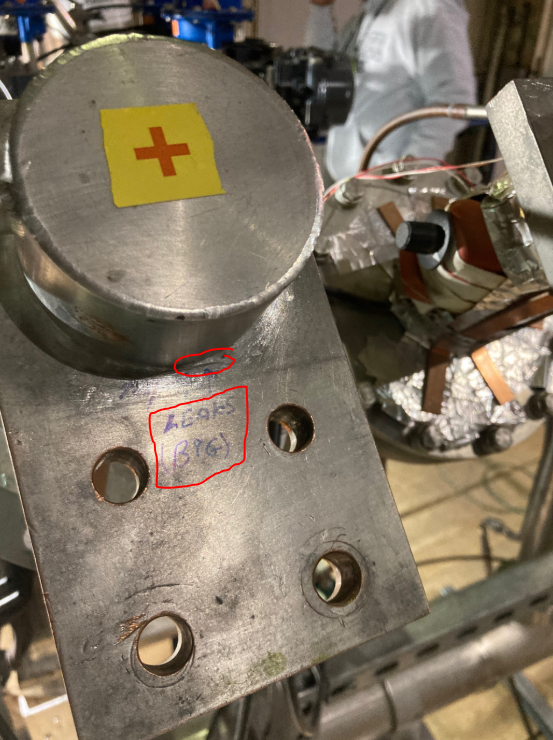sphenix-magnet-l AT lists.bnl.gov
Subject: sPHENIX discussion of the superconducting solenoid
List archive
Re: [Sphenix-magnet-l] The vacuum group will do the re-solder attempt
- From: "Yip, Kin" <kinyip AT bnl.gov>
- To: "sphenix-magnet-l AT lists.bnl.gov" <sphenix-magnet-l AT lists.bnl.gov>
- Cc: "Decker, Kenneth" <kdecker AT bnl.gov>, "O'Connor, Eric" <eoconnor1 AT bnl.gov>
- Subject: Re: [Sphenix-magnet-l] The vacuum group will do the re-solder attempt
- Date: Thu, 10 Mar 2022 17:00:13 +0000
|
Hi,
It’s actually the Cryo group who will try to fix the vacuum leak (as Roberto told me over the phone just now). I didn’t know who was who there ☹ I copied Roberto’s email below here:
So Ray look at the leak, and agreed to just do a indium solder wetting on top of the existing solder joint. The existing solder seems to be very soft. This is the lowest temperature fix, and will repeat the leak check afterwards.
So, this is “only” a vacuum leak, not a helium leak ---- another thing that Roberto educated me.
Kin
From: sPHENIX-magnet-l <sphenix-magnet-l-bounces AT lists.bnl.gov>
On Behalf Of Yip, Kin
Hello,
My previous came late …
But, I met with Ray Ceruti in 912 and Roberto Than was also there with the vacuum group technicians. Ray suggested that we should just attempt a soft-soldering and/or with indium to try to fix it. And the vacuum group technicians there have kindly agreed to do it. After that, they’ll do the leak check again.
In addition, I pointed to the broken screw just underneath it. We ran like that during the high-field test without fixing it --- also Ray’s suggestion ~2018. Ray has agreed to try to fix it now. ( I include a picture of the broken plastic screw. )
Kin
From: sPHENIX-magnet-l
<sphenix-magnet-l-bounces AT lists.bnl.gov>
On Behalf Of Yip, Kin
Dear All,
Ray would meet with me at 912 around 11 am to 11:15 am. I include the documentation from BaBar.
Kin
From: O'Connor,
Eric <eoconnor1 AT bnl.gov>
Good morning, Kin
After another recent leak test, we were able to get the vacuum level down to 10E-5 level, which was an improvement. Helium background was recorded at 10E-6. Internal leaks are taken care of and extremely minimal, however, we found one major leak source externally on top of the valve box. The solder used to join the (+) lead to the block has been gashed and cracked through as indicated by the picture below. The helium background rose to the 10E-4 range from 10E-6. The vacuum group believes this is because the copper block bolted onto this block is too large and flush to the cylindrical lead and cracked the solder. One future recommendation is to machine these attaching blocks to prevent this from occurring for the (+) and (-) leads.
However, this poses a question for the magnet division – what are the internals inside? We want to know if we can use a Grade 5 solder for this copper to SS transition, Indium solder, torch/weld over the existing solder, etc. We don’t want to damage any internals with the high heat based on the melting points of our options.
If you guys are around today, perhaps we can meet with the vacuum group at 912 today to discuss a solution to get the ball rolling. Once this is fixed, we can proceed with a pressure test. Please give me a call on my cell/office to coordinate or have any questions. Thank you.
Regards,
Eric O’Connor Associate Staff Engineer Cryogenic Systems, Collider-Accelerator Department Brookhaven National Laboratory Telephone: (631) 344-8952 Cell: (631) 546-8842 E-mail: eoconnor1 AT bnl.gov
|
-
[Sphenix-magnet-l] The vacuum group will do the re-solder attempt,
Yip, Kin, 03/10/2022
- Re: [Sphenix-magnet-l] The vacuum group will do the re-solder attempt, Yip, Kin, 03/10/2022
Archive powered by MHonArc 2.6.24.
